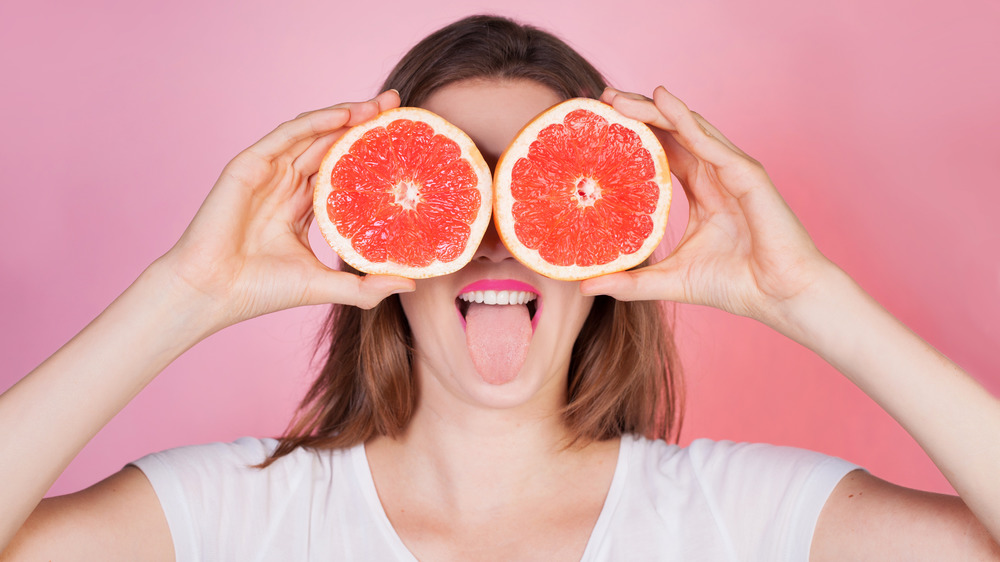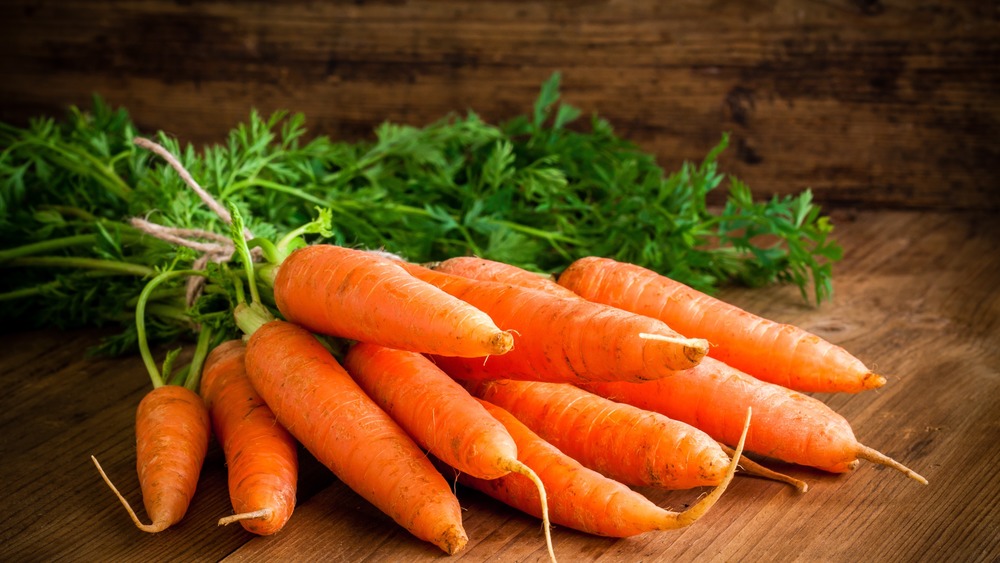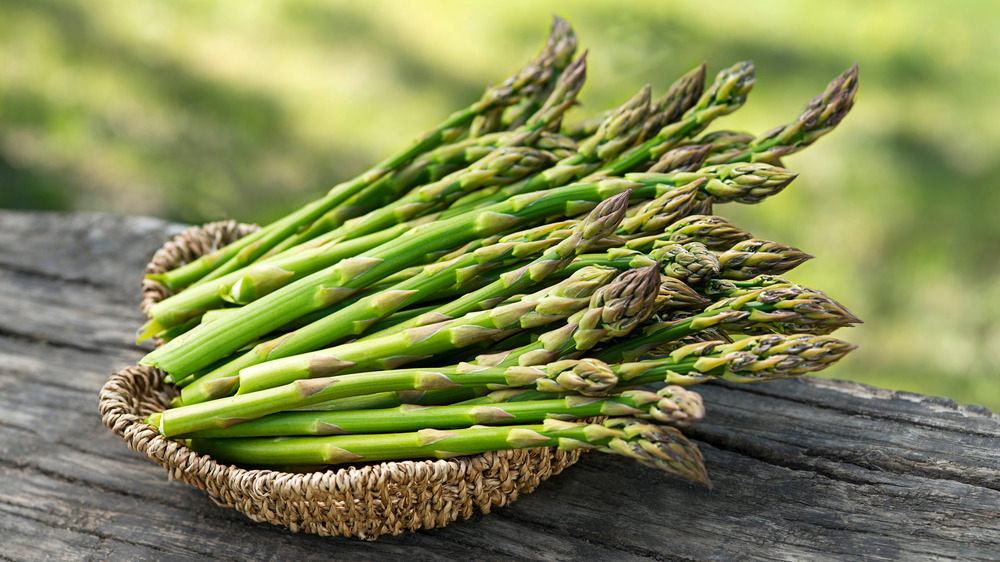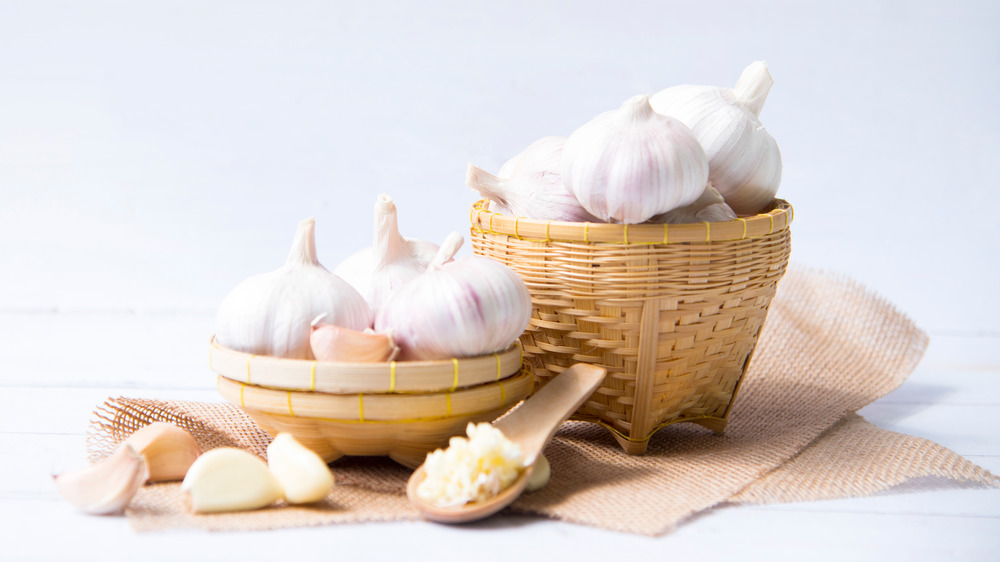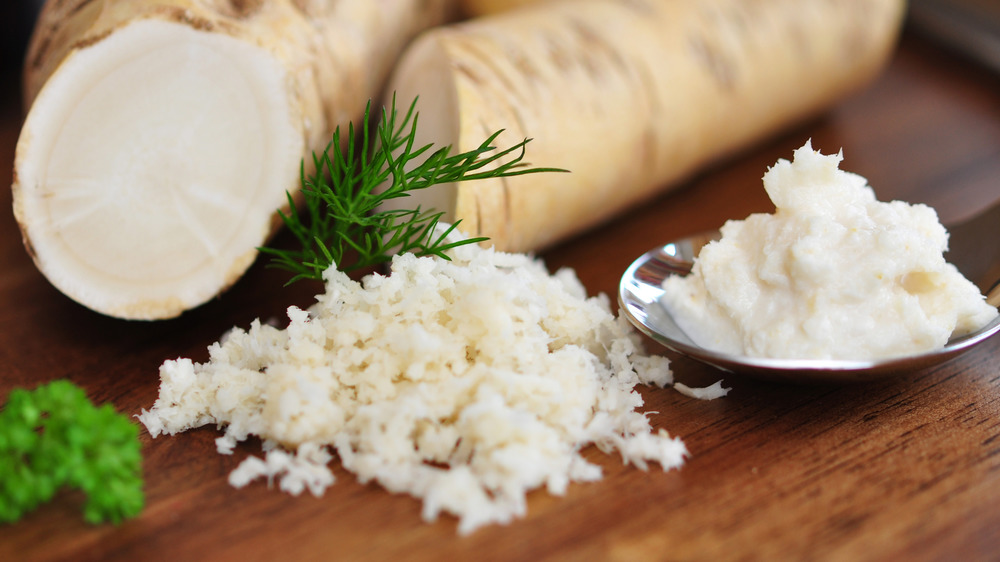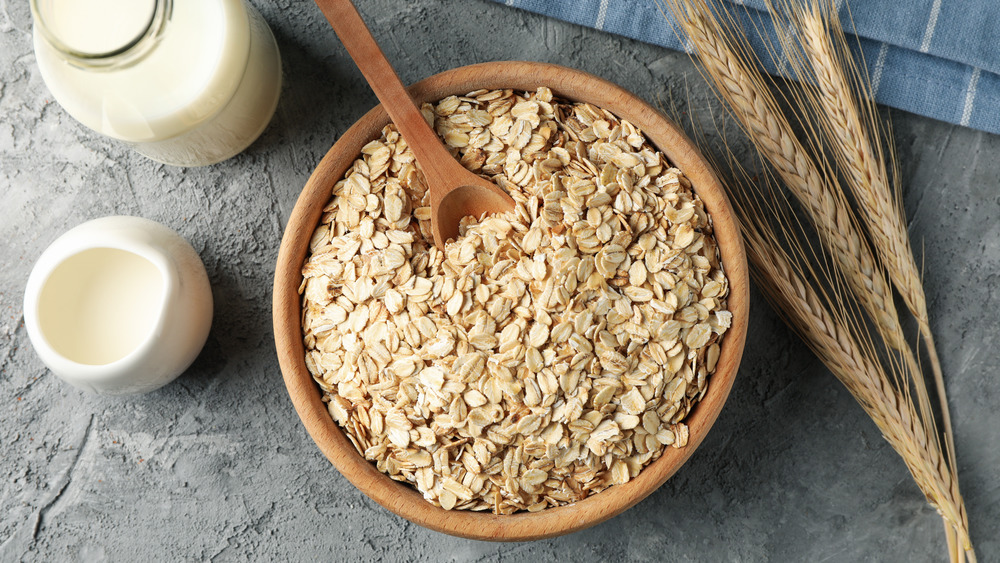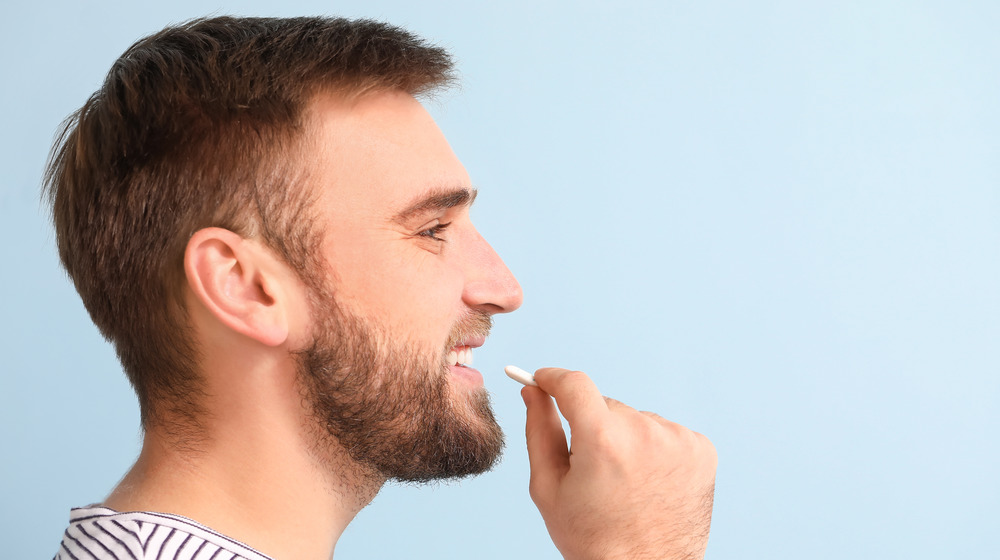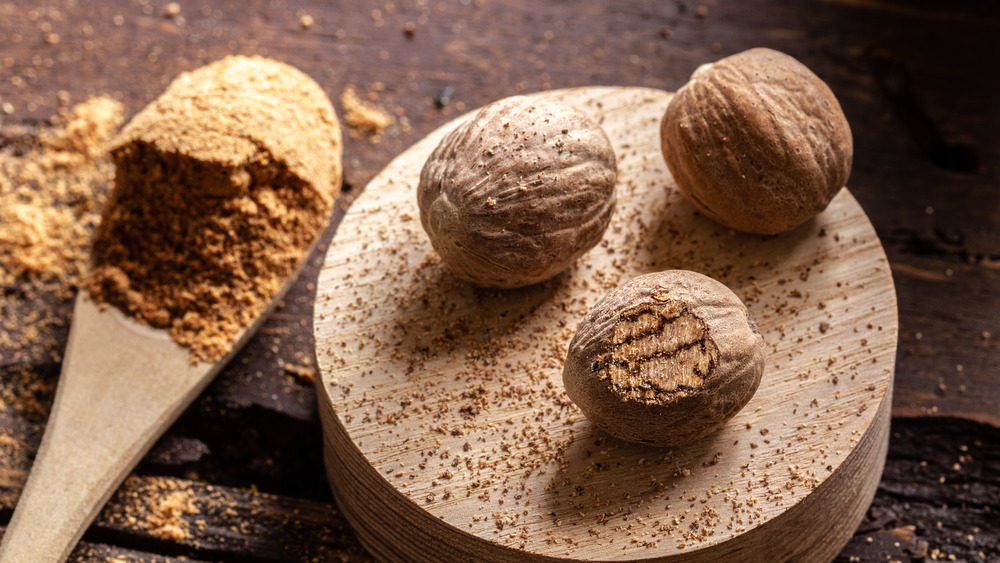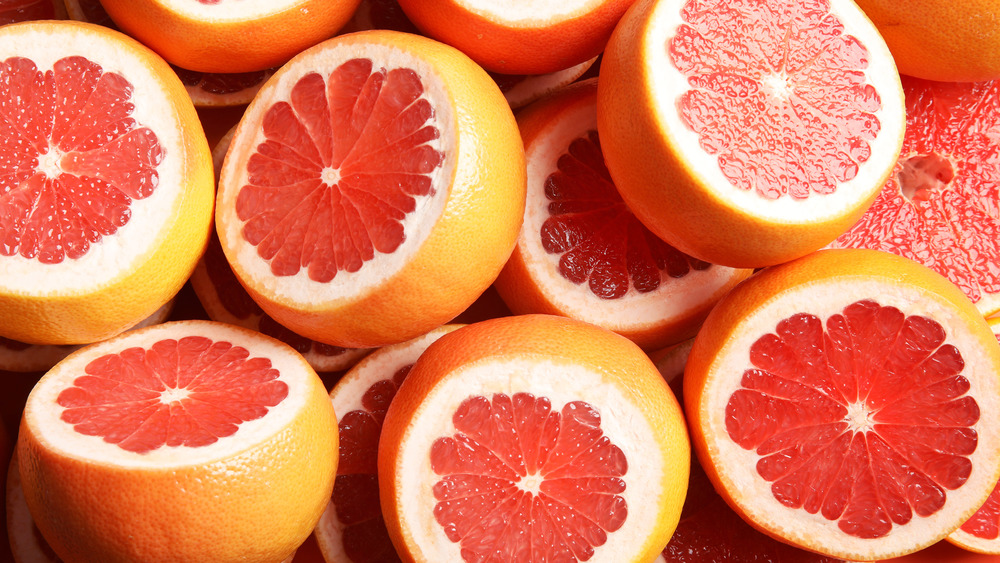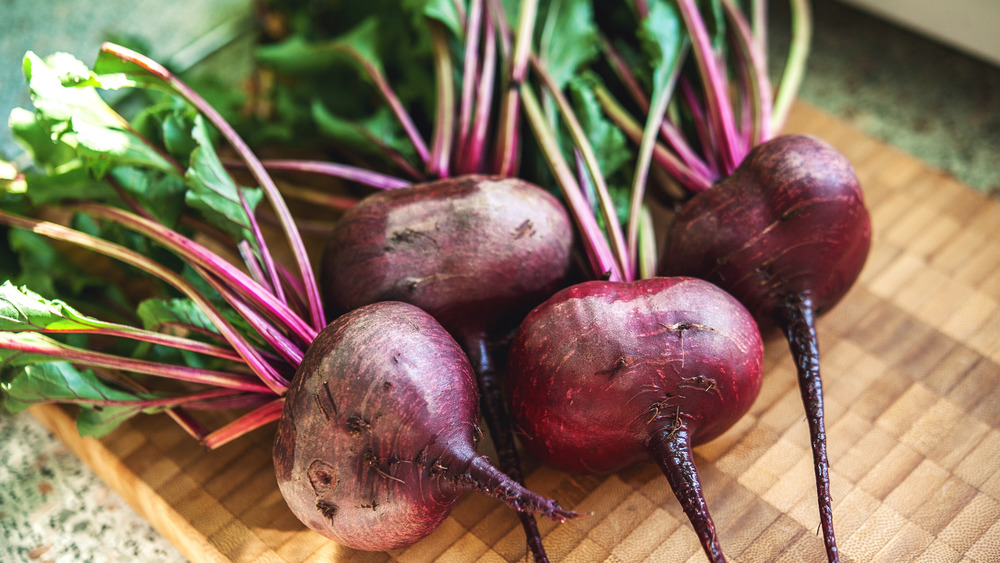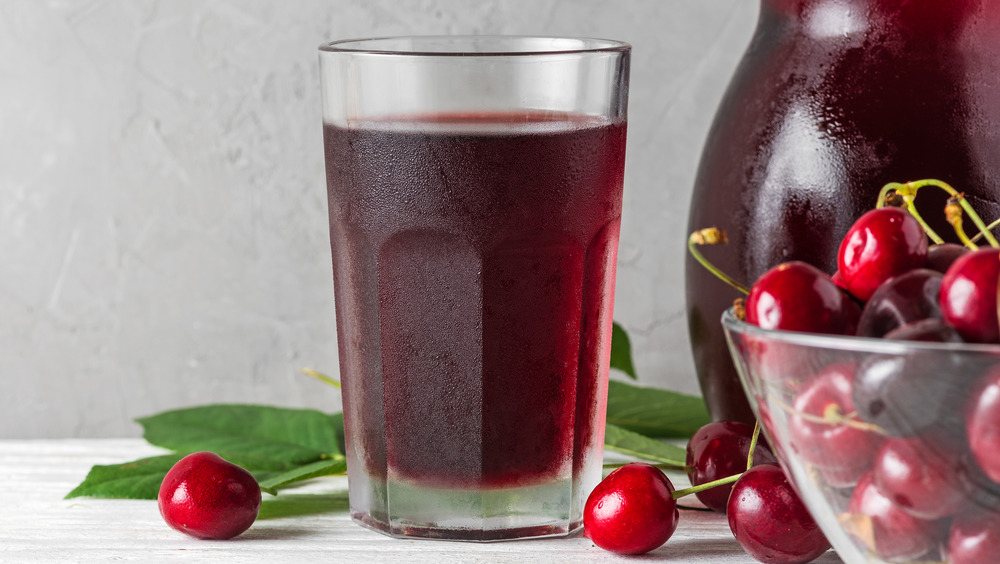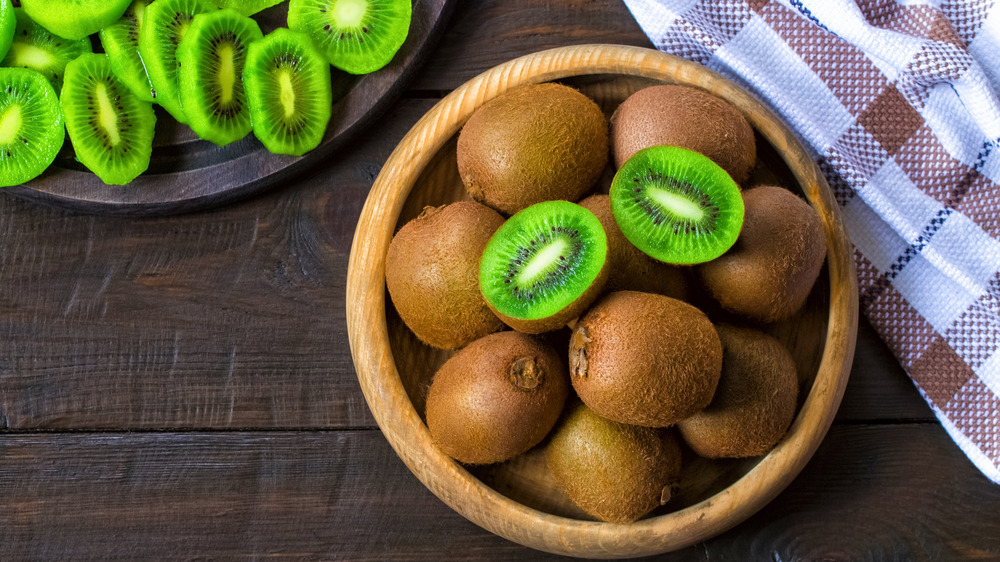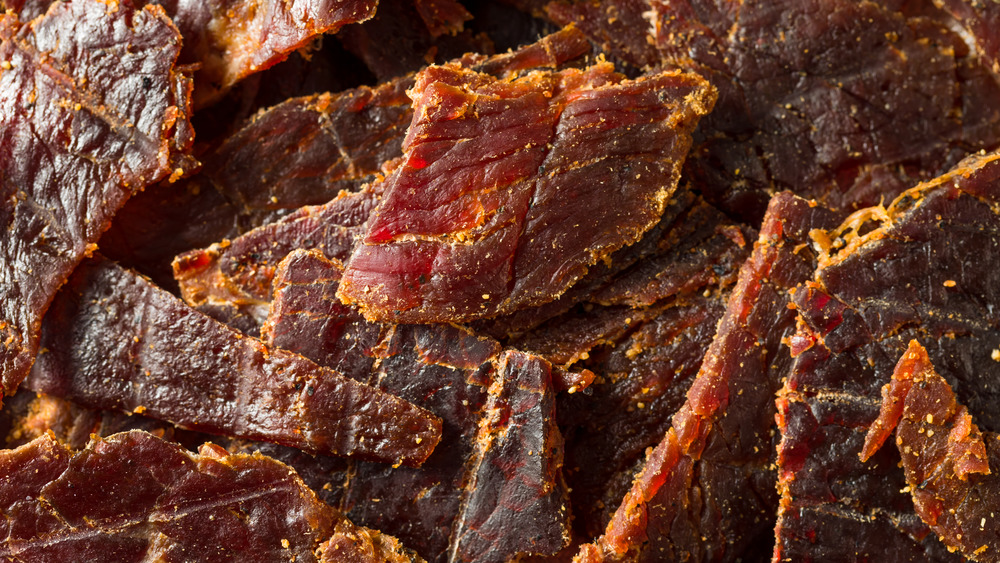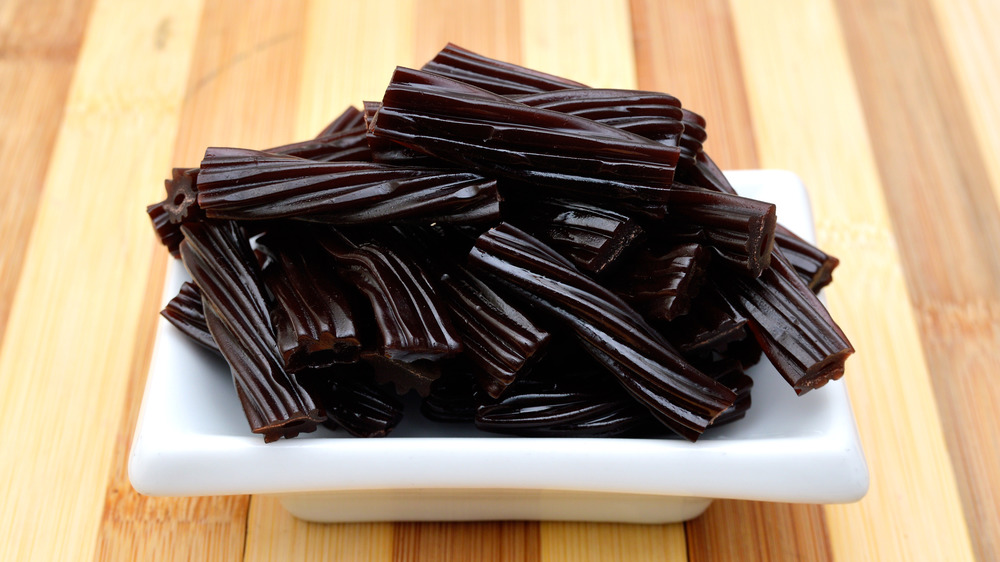Foods That Can Do Strange Things To Your Body
Since food is the fuel that powers our bodies, the foods we consume can have a number of good, bad, and sometimes downright strange effects on our systems. Yes, you really are what you eat. High-protein foods like whey, for example, can help to generate explosive muscle growth (via Men's Journal). Foods packed with omega-3 fatty acids like salmon can protect your hearts, helping to ward off disease, according to the Mayo Clinic.
On the flip side, there are foods like high fructose corn syrup. This substance contributes obesity, a 2010 study revealed. Additionally, eating too much salt can make you feel bloated, as well as increase your blood pressure and risk of heart disease (via Cleveland Clinic).
Even if a food doesn't have a negative or positive impact on the body, they can still have some effect — like changing the color of your urine to changing the scent of your skin. Here's a look at some foods that do some seriously strange things to your body.
Carrots can turn your skin orange
You've likely heard many times that carrots are one of nature's superfoods. They're low in calories, high in fiber, and have been reported to help with everything from strengthening your immune system to improving your eyesight (via Healthline). But strangely, the very nutrient that gives carrots their many nutritional "superpowers" — beta carotene — can have a weird side effect on your body. Whether you're regularly downing carrot juice, eating fresh baby carrots as a snack, or feasting on roasted carrots as a side dish, too many carrots can actually cause your skin to turn a slight shade of orange.
The condition is called carotenemia, and although it's more common in babies, it can occur in adults too. "It's caused by eating foods rich in beta carotene such as carrots or sweet potatoes and squash, though even foods that don't look orange such as spinach or kale, all of which are popular in baby foods today," Dr. Albert Yan, a pediatric dermatologist, told U.S. News & World Report.
Fortunately, the color of your whole body doesn't change. Nutritionist Deborah Krivitsky told the publication that "the most common sites are the palms of your hands, the soles of feet and the nose." The condition usually goes away within several weeks if you change your diet, she added.
Asparagus can make your pee smell funny
A seasonal veggie that's ideal paired with a steak or topped with Hollandaise sauce, asparagus is distinctive for its long, pointy green spears and mild earthy — yet savory — flavor (via The Spruce Eats).
Aside from its unique taste, asparagus also has another distinctive quality. When you eat even a little bit, it can dramatically change the scent of your pee. It's a phenomenon even Benjamin Franklin noticed all the way back in the 1870s when he wrote a letter stating: "A few stems of asparagus eaten, shall give our urine a disagreeable odour" (via Discover).
According to Smithsonian Magazine, the effect is caused by something called asparagusic acid, which is appropriately enough only found in asparagus. Apparently, after we eat asparagus, our bodies break this acid down into a number of different smelly and sulfur-packed compounds (similar to those that make a skunk stink so badly). The molecules in asparagus also "have a low enough boiling point that they can vaporize and enter a gaseous state at room temperature, which allows them to travel from urine into the air and up your nose," per Smithsonian. The foul pee scent isn't harmful, and it comes on quickly — usually within 30 minutes of eating the vegetable.
Garlic can change the scent of your sweat and breath
Garlic is a nutrient-packed superfood that can cause smelly changes to your body. Beloved in cuisine from all over the globe, garlic is one of the most commonly used flavor builders by chefs. You might want to start eating more garlic considering its number of impressive health benefits; it helps to fight off infection, lower blood pressure, and may even help you live a longer life (via Healthline). But those health benefits come with a price. The compounds that make garlic so healthy also give it its unique and powerful scent, which can "rub off" and make you smell like garlic too.
According to researchers at Michigan State University, when you eat garlic regularly, the healthy oils inside it wind up infiltrating tissue in your body, including your skin and lungs. This can not only give you a noticeable garlic breath, but also cause the sweat emanating from your pores to smell like garlic as well.
Luckily, there are things you can do to help minimize the scent. In a study published in the Journal of Food Science, researchers reported that eating apples, lettuce, and mint can help to decrease the smell of garlic, neutralizing the compounds responsible for the unpleasant odor.
Spicy horseradish can help clear stubborn sinus congestion
A relative of mustard, wasabi, broccoli, and cabbage, horseradish is ideal for adding a fiery bite to sandwiches. But according to Saveur, this potent condiment — which is created when you grind and pickle an otherwise useless looking gnarly brown root — is good for more than just its flavor.
Horseradish has been purported to help fight off inflammation and strengthen the immune system (via Verywell Health). And the New York Sinus Center has said that horseradish "can help increase facial circulation, help clear the sinus passages and help ease mucus out of the upper-respiratory passages." Food researcher Dawn Chapman explained to Chowhound that as we eat horseradish, vapors called allyl isothiocyanate circulate through the mouth and up into the nasal cavity. In turn, this causes a nerve response in the nose and sinuses, according to Chapman, which causes that stinging sensation in the nose.
Sinus relief from horseradish comes on quickly. The Spruce Eats cautioned that after eating horseradish,"you will instantly feel a tingling sensation in your nasal area and within moments the mucus in your nose will begin to loosen."
Your morning bowl of oatmeal can help to soothe a painful sunburn
Having oatmeal for breakfast is a great idea — even greater than you may have realized. It turns out that high-fiber, low-calorie oatmeal — which, has been shown to help significantly reduce risk for heart disease when eaten regularly — has a number of other unusual benefits as well.
When applied topically, oatmeal can help to treat stubborn acne and soothe dry skin (via Good Housekeeping). Oats are well known for their ability to reduce inflammation, dermatologist Nisith Sheth told BBC News. Oatmeal can even be used to treat a sunburn.
Prevention recommends simply adding it to your bath. Just grind up some plain, uncooked oatmeal in a food processor and add the powder to a bathtub filled with cool water, the publication advised. Soak in the tub for 15 to 20 minutes. When you get out of the bath, gently pat your skin dry — as vigorously rubbing your skin with a towel can further inflame already sensitive skin.
Chewing too much sugar-free gum could cause diarrhea
Gum has some definitive pluses and minuses. Besides helping to keep your breath fresh, the Canadian Society of Intestinal Research reported that chewing gum aids in digestion, naturally increasing saliva production. It's also good for your teeth, helping to remove plaque and other cavity-causing particles. But too much gum chewing also has its downside. Chewing gum regularly can cause you to accidentally swallow air and may leave you feeling bloated all the time. And chewing large amounts of sugar-free gum, in particular, it can trigger chronic diarrhea, gastroenterologist Roshini Rajapaksa cautioned when speaking with Health.
The British Medical Journal documented the cases of two individuals in Germany who chewed up to 20 sticks of sugar-free gum daily. They each developed chronic diarrhea and ultimately lost more than 20 pounds before doctors diagnosed the problem and intervened.
The issue stems from "sugar alcohols" which are used to sweeten sugar-free gum (via Livestrong). Although calorie free, these substances (lactitol, mannitol, xylitol, and sorbitol) aren't fully absorbed by the body when consumed and can sometimes act as a laxative — especially when present in your digestive system in large amounts. Talk about a bubble burster.
The classic holiday spice nutmeg can cause hallucinations
Nutmeg is an essential ingredient in many baked goods. It adds warm, seasonal flavor to coffee or espresso. On savory entrees like steak, nutmeg provides a slightly sweet taste that pairs perfectly with heat from peppers. But nutmeg has other uses as well. Healthline explained that nutmeg can potentially stabilize blood sugar and even improve your mood. And, well, it can also make you high.
According to an article by physician Andrew Weil, the traditional holiday spice — which is created by grinding dried seeds from the nutmeg tree — contains a natural compound called myristicin. This compound can trigger hallucinogenic episodes similar to those produced by peyote and LSD. However, getting high on nutmeg is incredibly unpleasant, ABC News warned.
The dose of nutmeg needed to make you hallucinate is so large it can cause "severe gastrointestinal reactions, including nausea, vomiting and diarrhea." And after the high does kick in several hours after you've eaten the nutmeg, you can also experience heart and nerve problems. "Most people only try it once because they have such nasty side effects," Dr. Jeffrey Bernstein, a poison control specialist told ABC. "The rewards are not worth the risks."
Grapefruit can increase your risk for skin cancer
It's tart and delicious on its own. Paired with mezcal or vodka, it makes a great cocktail. But beware: Even though grapefruit juice is a low-calorie, highly nutritious drink, the ruby red juice has some drawbacks. For starters, the U.S. Food and Drug Administration warned that grapefruit juice can interfere with the way the body metabolizes certain medications, including drugs designed to improve cholesterol levels, lower blood pressure pills, and reduce anxiety.
People who drink grapefruit juice regularly may also face a slightly increased risk of the particularly dangerous form of skin cancer called melanoma. In a 2015 study published in the Journal of Clinical Oncology, researchers tracked the health of more than 100,000 adults over 25 years and found that individuals who regularly drank grapefruit juice or ate the fruit whole had a higher risk of developing melanoma compared to people who avoided the citrus fruit.
In a statement, the study's authors warned that "those who consume a lot of grapefruit and/or orange juice should be particularly careful to avoid prolonged sun exposure." The effect appears to be due to substances called furocoumarins found in grapefruit which make the skin more sensitive to sunlight, including melanoma-inducing UV rays.
Beets can turn your urine bright red
A nutritional powerhouse capable of helping to lower your risk of heart disease and cancer as well as reducing levels of inflammation in the body that may lead to the development of diabetes, beets may be one of the healthiest vegetables you can eat (via the Cleveland Clinic). But whether you're downing them raw, boiled, pickled, or diced up in a salad, they can also do one very strange thing to your body: they can turn your urine bright red.
According to Livestrong, the phenomenon is fittingly known as beeturia. Although it's harmless, it can be scary due to its resemblance to blood. "Not everyone will experience a change in urine color after eating beets," the site explained, adding that the exact hue of your urine — from light pink to a shockingly bright red — depends on the person and the amount of beets consumed.
A 2017 article in Food & Nutrition Research attributes beeturia to a compound called anthocyanin. The pigment gives beets their deep purplish red color. And when you eat beets, the pigment can also be released into the body during digestion, tainting the color of your urine.
Tart cherry juice can help your body recover faster following a workout
Some trainers swear by protein shakes following a workout. Other fitness pros stick to brightly colored fruit smoothies. But if you're looking for something that's been scientifically proven to bolster the results of all those hours you've logged in the gym, there's another beverage worth adding to your post-workout drink menu: tart cherry juice.
According to registered dietitian Toby Amidor, tart cherry juice can be incredibly beneficial following a workout. "There's growing research that supports its benefit for helping athletes recover," she wrote in a column for Today's Dietitian. Cycling coach Lynda Wallenfels agrees. She explained to Training Peaks that tart cherry juice works in a number of ways. It's packed with a compound called anthocyanin that helps to reduce inflammation following a workout. It also contains compounds that relieve muscle pain, boost immunity, and even improve the quality of your sleep — all essential for proper recovery following a workout.
If that weren't enough, drinking tart cherry juice before working out can also boost your exercise performance, a 2020 study in the Journal of the American College of Nutrition revealed.
Kiwis can improve the quality of your sleep
Originally grown in China where they were known as "gooseberries," the first kiwifruit didn't arrive on U.S. shores until the '50s (via Time). But we're glad they're here now! Inside that fuzzy peel, the brilliant green kiwifruit, or kiwi, is packed with fiber, antioxidants and loads of vitamin C — roughly 230 percent of your recommended daily intake per serving, according to WebMD. But there's an even better reason to consider adding kiwis to your plate — especially at bedtime. Kiwi can help you get a better night's sleep!
In a study conducted at Taiwan's School of Nutrition and Health Sciences at Taipei Medical University, researchers asked a group of men and women with existing sleep problems to eat two kiwis every night before bed for a month. At the end of the study, the researchers found that regular kiwi consumption helped participants to fall asleep more quickly, sleep more soundly, and also get better quality sleep overall.
The sleep experts at the National Sleep Foundation believe kiwis' sleep inducing powers may stem from their high levels of folate as well as abundant reserves of serotonin — a compound the body uses to produce melatonin, a hormone which helps to naturally regulate the body's internal biological clock.
Beef jerky could cause you to experience a manic episode
Eating processed meats and jerky could be detrimental to your mental health, especially if you have bipolar disorder. That's the warning from a study conducted at Johns Hopkins University in which researchers analyzed more than a decade's worth of data culled from 1,100 men and women, including some with a history of psychiatric conditions (via Medical News Today). When the researchers looked closely at the habits of the individuals enrolled in the study, they found that people with a history of consuming processed meats were about 3.5 times more likely to have been hospitalized due to a manic episode than individuals who rarely ate the stuff.
After further trials, the school's physicians now speculate that the manic episodes individuals experienced could have been due to nitrates within processed meats, The Atlantic reported. Long used to help preserve meat sticks and jerky, nitrates have previously been connected to an increased risk for Alzheimer's disease and certain types of cancer (via Medical News Today).
The lead author of the Johns Hopkins study, Robert Yolken, told NBC News that more research is, of course, needed. However, avoiding processed meats could help people with mental conditions better control their illness.
Black licorice can be as divisive as it is deadly
Black licorice is a controversial candy. Some people live for its potent and unique blend of sweet, savory, herbaceous and medicinal flavors while others can't stand that Nyquil-like taste. Which camp you fall into may be the result of genetics. Smell and taste researcher Marcia Pelchat told NBC News that your like or dislike for a certain taste isn't learned. So if you're one of the folks who don't like black licorice, you were probably born that way.
But love it or hate it, black licorice has another unique trait going for it — but not a good one. In large doses, it can be deadly. The U.S. Food and Drug Administration even issued a warning stating as much. In it, the agency said "If you're 40 or older, eating 2 ounces of black licorice a day for at least two weeks could land you in the hospital with an irregular heart rhythm or arrhythmia."
The risk stems from a compound called glycyrrhizin within the candy which can alter levels of potassium in the body, potentially causing "abnormal heart rhythms, as well as high blood pressure, edema (swelling), lethargy, and congestive heart failure." Scary!
Oysters can boost your libido
Of all the aphrodisiac foods in the world, oysters may have the greatest potential to actually increase sex drive. For many, libido starts in the mind, and according to Livestrong, "oysters are like a multi-vitamin for your brain." Their ample levels of vitamin B12 and omega-3 fatty acids are ideal for fueling all types of cognition. "Oysters can really pack a healthy punch," registered dietitian Julia Zumpano told the Cleveland Clinic. They're filled with vitamin D, copper, selenium, and iron — all of which help to keep your body running in peak condition.
As for their sex-boosting potential, believers attribute that power to the incredible levels of zinc found within the shelled seafood. "Oysters contain the highest concentration of zinc of any food with 128 percent of your daily dose in one three-ounce serving," Livestrong revealed.
CBS News reported that high levels of zinc are "essential for testosterone production and maintenance of healthy sperm" in men, and added that zinc also plays a role in female libido. Oysters are also a good source of the hormone dopamine, which researchers at Penn State link to improved libido and sexual functioning.

